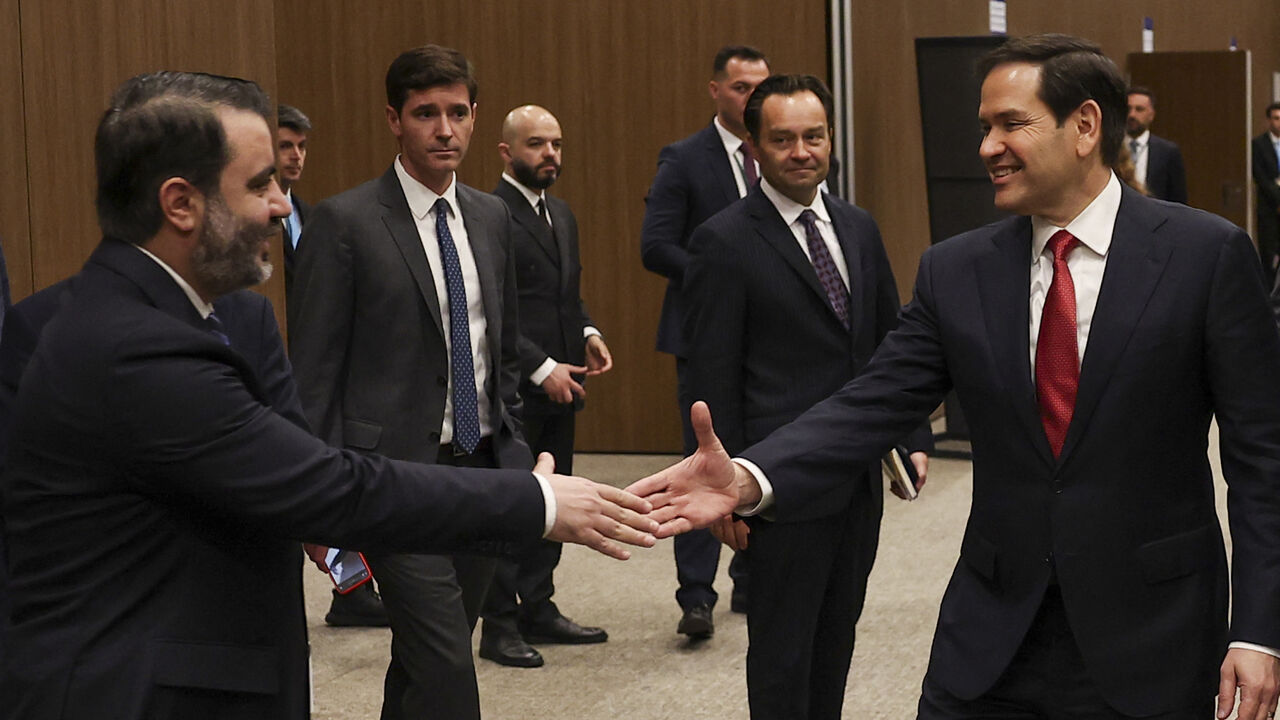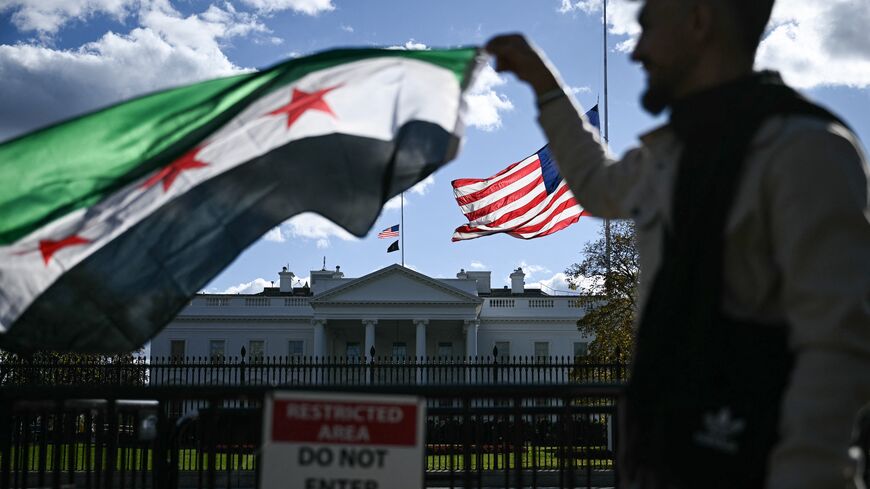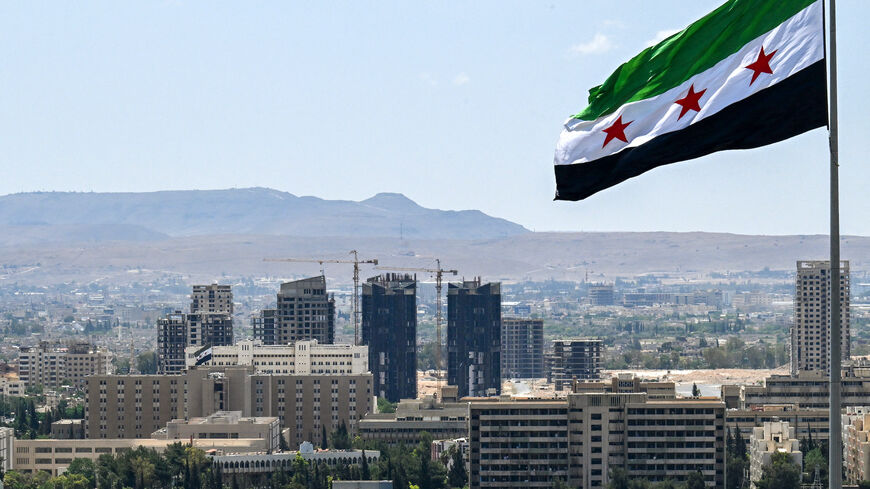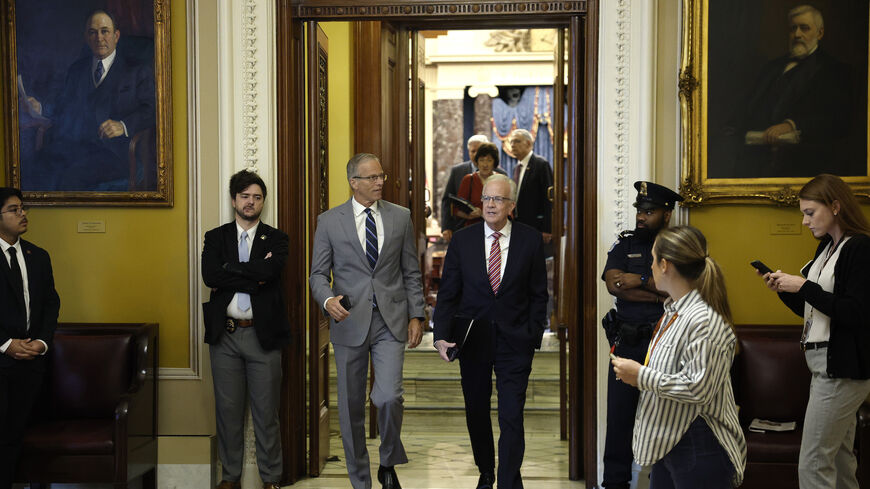In first visit in 25 years, Syrian FM pushes sanctions relief in Washington
Asaad al-Shibani’s visit to Washington comes as Syria seeks sanctions relief and engages in US-mediated talks with Israel on a security agreement.

Syria’s foreign minister arrived Thursday in Washington, where he met with US counterparts in the first official visit by a Syrian FM to the US capital in over two decades.
Syrian Foreign Minister Asaad al-Shibani's visit “reflects Syria’s openness to direct dialogue with the United States,” the Foreign Ministry said in a statement to Syrian state news agency SANA.
The ministry said that during the visit, “issues of mutual interest in the political, security and economic spheres will be discussed.”
On Thursday, Shibani and Syria's director for American affairs, Qutaiba Idlbi, met with officials at the US Treasury Department including US envoy to Syria Tom Barrack and Anna Morris, the acting assistant secretary of the Treasury for terrorist financing. A statement released by the Treasury said that the department "is working with Syria to responsibly and safely reconnect its economy to the global financial system while combating the financing of terrorism."
Senator Jeanne Shaheen (D-N.H.), ranking member of the Senate Foreign Relations Committee, also led a group of senators to meet with Shibani, including Roger Wicker (R-Miss.), Chris Coons (D-Del.), Joni Ernst (R-Iowa), Jacky Rosen (D-Nev.), Markwayne Mullin (R-Okla.), Richard Blumenthal (D-Conn.) and Andy Kim (D-N.J.).
Today, @USAMBTurkiye facilitated a productive meeting with Syrian Foreign Minister Asaad al-Shaibani. We discussed steps that are essential for Syria to ensure their full access to the international economy. Syria has an opportunity to build a stable democracy, something the… pic.twitter.com/R5U0v9RQx9
— Senate Foreign Relations Committee Chairman (@SenateForeign) September 18, 2025
On the US side, the senators "noted that sanctions are prohibiting urgently needed investment in Syria’s economy," according to a statement released by the committee. Shaheen added that "Syria’s economy is in crisis. … If we are too slow to act, we risk plunging Syrians back into conflict."
Shibani also met with Senator Jim Risch (R-Idaho), who serves as the chairman of the Senate Foreign Relations Committee. According to a statement from Risch, they "discussed steps that are essential for Syria to ensure their full access to the international economy."
"Syria has an opportunity to build a stable democracy, something the region desperately needs right now, and I am hopeful they are on the right track," Risch added.
He also met with representatives Abraham Hamadeh (R-Ariz.) and Joe Wilson (R-S.C.). Wilson called on Congress to "fully repeal the Caesar Act" following the meeting.
Wilson, who has been an advocate of US openness to Syria's new government, and Shaheen led a delegation of US officials to Syria in August, meeting with Syrian President Ahmed al-Sharaa.
Senators Chris Van Hollen (D-Md.) and Lindsey Graham (R-S.C.) each met with Shibani on Thursday as well. According to Syria's Foreign Ministry, the meeting between Shibani and Graham "focused on ways to strengthen bilateral relations between Syria and the United States and to lift the US sanctions imposed on Syria." Graham told Axios on Wednesday that discussions would include the Caesar Act.
Passed in 2019, the Caesar Syria Civilian Protection Act imposed sweeping sanctions on former Syrian President Bashar al-Assad's government and individuals and entities that do business with it in response to atrocities committed during the country’s civil war. Section 7431(a) of the act allows for the suspension, in whole or in part, of Caesar sanctions for renewable 180-day periods if certain conditions are met. In May, the State Department used this authority to issue a 180-day waiver. Caesar can be lifted through a provision in the National Defense Authorization Act (NDAA) and can be repealed entirely via new legislation from Congress.
On Monday Graham and Van Hollen submitted an amendment to the NDAA that stipulates that a suspension of Caesar sanctions must be contingent on submitting a report every 120 days evaluating the Syrian government's compliance with certain conditions. These conditions include:
- Committing to the global coalition to defeat ISIS
- Safeguarding and ensuring proper representation of minority groups in Syria
- Maintaining peaceful relations with regional neighbors, including Israel, and "taking action against actors and groups in Syria that threaten the security of Syria's neighbors"
- Ending any financing, assisting or harboring of terrorist organizations
- Removing foreign fighters from state institutions
- Investigating human rights abuses since Assad was toppled on Dec. 8, 2024
The United States has rolled back other sanctions on Syria and has pushed the UN to lift international sanctions, as Al-Monitor's Elizabeth Hagedorn has reported.
According to Axios, Graham said that he would support the cancellation of Caesar sanctions if Syria makes progress on a security agreement with Israel and joins the US-led alliance formed in 2014 to fight against the Islamic State.
On Friday, Shibani met with Deputy Secretary of State Christopher Landau. A statement from Landau after the meeting said that the two discussed "the future of Syria, Israel-Syria relations, economic opportunity and countering terrorism."
Just a day before arriving in Washington, Shibani was in London for talks with Israeli Strategic Affairs Minister Ron Dermer mediated by Barrack, according to an Axios report.
Against that backdrop, Agence France-Presse reported Tuesday that Syria has begun withdrawing its heavy weaponry from the country's south up to six miles outside the capital. Israeli troops currently hold nine posts in southern Syria, seized after the fall of Assad in December 2024.
Israeli Prime Minister Benjamin Netanyahu has repeatedly called for a demilitarized zone in the south, saying late last month that there are “ongoing discussions about the possibility of disarming southern Syria.” Sharaa confirmed last Friday that talks are underway to return Israeli forces to their positions prior to December 2024.
Shibani was in Washington in April for the Spring Meetings of the World Bank and the International Monetary Fund. While in the United States, Shibani also stopped in New York for talks at the UN.
Reuters reported on Thursday that a number of US diplomats at the de facto US mission to Syria in Turkey have been dismissed from their posts.
This developing story has been updated since initial publication.




